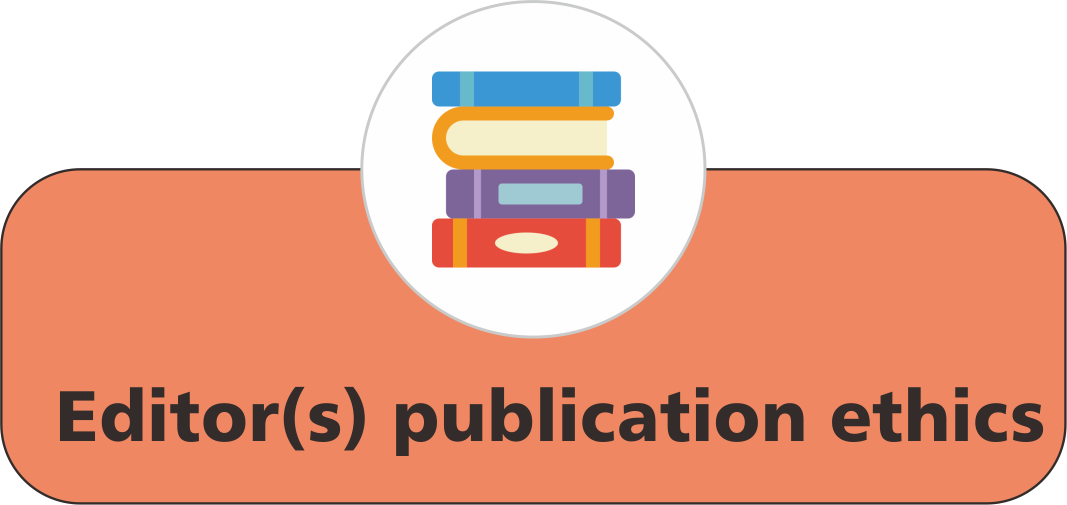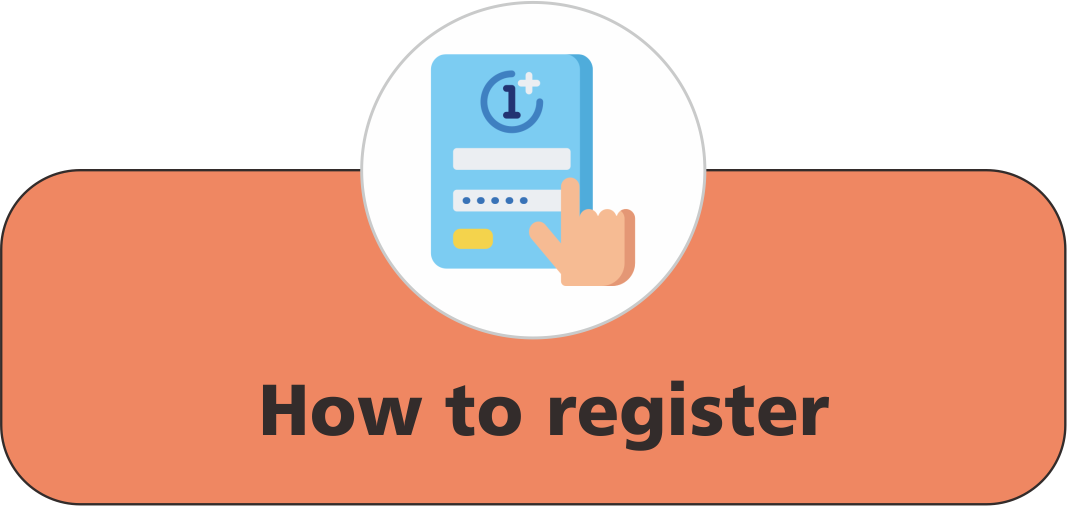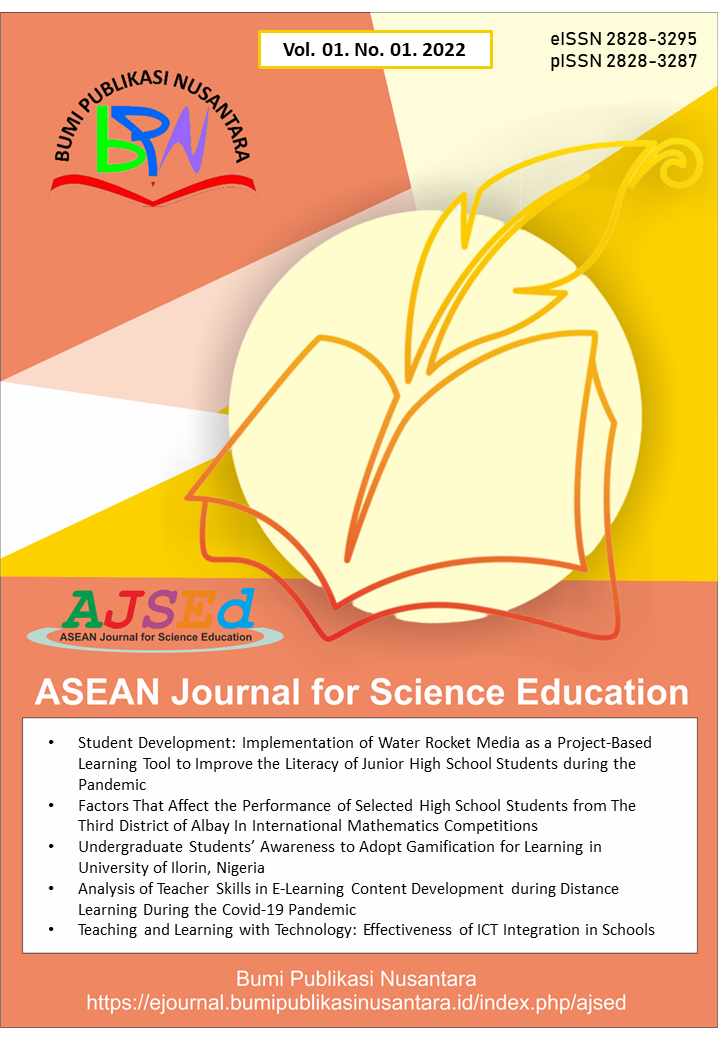Chemistry Educators’ Readiness and Intentions to Integrate Game-Based Software: A Survey
 ), Hameed Olalekan Bolaji(2), Abubakar Shola Bello(3),
), Hameed Olalekan Bolaji(2), Abubakar Shola Bello(3),
(1) Al-Hikmah University
(2) Al-Hikmah University
(3) Al-Hikmah University
 Corresponding Author
Corresponding Author
Abstract
This study explores the readiness and intentions of chemistry educators in Kwara State, Nigeria, to integrate game-based software into their teaching practices. As digital learning tools become increasingly prominent, understanding how educators perceive and adopt such innovations is essential. A descriptive survey design was employed, involving 270 chemistry educators across various educational institutions. Data were collected using a validated 15-item Likert-scale questionnaire. The findings revealed that while most educators were aware of game-based software, many lacked a clear understanding of its pedagogical benefits. Despite this, participants expressed generally positive perceptions of its potential to improve teaching efficiency, student engagement, long-term retention, and access to learning resources. Although educators showed high levels of intention to adopt game-based software, readiness varied due to infrastructural limitations, lack of training, and resistance to change. The study recommends comprehensive training, improved technological infrastructure, and pilot projects to support the effective implementation of game-based software in chemistry education.
Keywords
References
Ackey, R., Amenorfe, L. P., Harvey, F., Somiah, P. A., and Adarkwah, D. (2023). Using games in teaching integrated science: Perceptions and readiness of teachers. International Journal of Science Education and Teaching, 2(2), 76-86.
Adeoye, B. F., and Adeniran, A. O. (2011). Trends and challenges of e-learning in national open University of Nigeria. The African symposium: An online journal of the African Educational Research Network, 11(2), 99-105.
Adeyemo, S. A., Adedoja, G. O., and Adelore, O. (2018). Digital game-based learning and engagement of secondary school students in Nigeria. Journal of Educational Technology Systems, 47(1), 90-105.
Barz, N., Benick, M., Dörrenbächer-Ulrich, L., and Perels, F. (2024). The effect of digital game-based learning interventions on cognitive, metacognitive, and affective-motivational learning outcomes in school: A meta-analysis. Review of Educational Research, 94(2), 193-227.
Bolaji, H. O., and Adeoye, M. A. (2022). Accessibility, usability, and readiness towards ICT tools for monitoring educational practice in secondary schools. Indonesian Journal of Multidisciplinary Research, 2(2), 257-264.
Byusa, E., Kampire, E., and Mwesigye, A. R. (2022). Game-based learning approach on students' motivation and understanding of chemistry concepts: A systematic review of the literature. Heliyon, 8(5).
Cahyana, U., Paristiowati, M., Savitri, D. A., and Hasyrin, S. N. (2017). Developing and application of mobile game based learning (M-GBL) for high school students performance in chemistry. Eurasia Journal of Mathematics, Science and Technology Education, 13(10), 7037-7047.
da Silva Júnior, J. N., Lima, M. A. S., Pimenta, A. T. A., Nunes, F. M., Monteiro, Á. C., de Sousa, U. S., and Winum, J. Y. (2021). Design, implementation, and evaluation of a game-based application for aiding chemical engineering and chemistry students to review the organic reactions. Education for Chemical Engineers, 34, 106-114.
Erman, E. (2017). Factors contributing to students’ misconceptions in learning covalent bonds. Journal of Research in Science Teaching, 54(4), 520-537.
Hafeez, M. (2022). Effects of game-based learning in comparison to traditional learning to provide an effective learning environment: A comparative review. Contemporary Educational Researches Journal, 12(2), 89–105.
Hartt, M., Hosseini, H., and Mostafapour, M. (2020). Game on: Exploring the effectiveness of game based learning. Planning Practice and Research, 35(5), 589–604.
He, M., Ratanaolarn, T., and Sitthiworachart, J. (2024). Design and implementation of online gaming for learning motivation and achievement improvement in computer information technology curriculum. Computer-Aided Design and Applications, 21, 268-280.
Hooshyar, D., Pedaste, M., Yang, Y., Malva, L., Hwang, G.-J., Wang, M., Lim, H., and Delev, D. (2021). From gaming to computational thinking: An adaptive educational computer game based learning approach. Journal of Educational Computing Research, 59(3), 383–409.
Hussein, M. H., Ow, S. H., Cheong, L. S., and Thong, M.-K. (2019). A digital gamebased learning method to improve students' critical thinking skills in elementary science. IEEE Access, 7, 96309–96318.
Kebritchi, M., Hirumi, A., and Bai, H. (2010). The effects of modern mathematics computer games on mathematics achievement and class motivation. Computers and Education, 55(2), 427-443.
Li, F. Y., Hwang, G. J., Chen, P. Y., and Lin, Y. J. (2021). Effects of a concept mapping based two tier test strategy on students' digital game-based learning performances and behavioural patterns. Computers and Education, 173, 104293.
Liu, Z. Y., Shaikh, Z., and Gazizova, F. (2020). Using the concept of game-based learning in education. International Journal of Emerging Technologies in Learning (iJET), 15(14), 53 64.
Lopez-Fernandez, D., Gordillo, A., Alarcon, P. P., and Tovar, E. (2021). Comparing traditional teaching and game-based learning using teacher-authored games on computerscience education. IEEE Transactions on Education, 64(4), 367–373.
Mezentseva, L. V., Kolganov, S. V., Dvoryankin, O. A., and Tuganova, S. V. (2021).Game-driven learning in the digital age: A systematic review and meta-analysis. Turkish Journal of Computer and Mathematics Education (TURCOMAT)., 12(10), 2244–2253.
Mikrouli, P., Tzafilkou, K., and Protogeros, N. (2024). Applications and learning outcomes of game-based learning in education. International Educational Review, 2(1), 25-54.
Noroozi, O., Dehghanzadeh, H., and Talaee, E. (2020). A systematic review on the impacts of game based learning on argumentation skills. Entertainment Computing, 35, 100369.
Nwosu, K. C., and Anene, C. (2020). The role of digital game-based learning in personalized education and remote learning in Nigeria. Nigerian Journal of Educational Technology, 4(2), 15-29.
Nzeyimana, J. C., and Ndihokubwayo, K. (2019). Teachers’ role and learners’ responsibility in teaching and learning science and elementary technology in Rwanda. African Journal of Educational Studies in Mathematics and Sciences, 15(2), 1-16.
Ogunduyile, F. A., Olabiyi, O. S., and Afolabi, F. O. (2019). Impact of educational games on students' performance in science subjects in Nigerian secondary schools. Journal of Science Education and Technology, 28(3), 203-212.
Oye, N. D., Iahad, N. A., and Ab.Rahim, N. (2012). The impact of e-learning on students' performance in tertiary institutions. International Journal of Computer Networks and Wireless Communications, 2(2), 121-130.
Pellas, N., and Mystakidis, S. (2020). A systematic review of research about game-based learning in virtual worlds. Journal of Universal Computer Science, 26(8), 1017–1042.
Priyaadharshini, M., Dakshina, R., and Sandhya, S. (2020). Learning analytics: Game-based learning for programming course in higher education. Procedia Computer Science, 172, 468 472.
Qian, M., and Clark, K. R. (2016). Game-based learning and 21st century skills: A review of recent research. Computers in Human Behavior, 63, 50-58.
Syal, S., and Nietfeld, J. L. (2024). Examining the effects of a game-based learning environment on fifth graders' reading comprehension and reading motivation. Journal of Educational Psychology 116(5), 805-819.
Article Metrics
Abstract View : 464 times
: 464 times Download : 351 times
Download : 351 times
Refbacks
- There are currently no refbacks.
Copyright (c) 2025 Bumi Publikasi Nusantara

This work is licensed under a Creative Commons Attribution-ShareAlike 4.0 International License.







